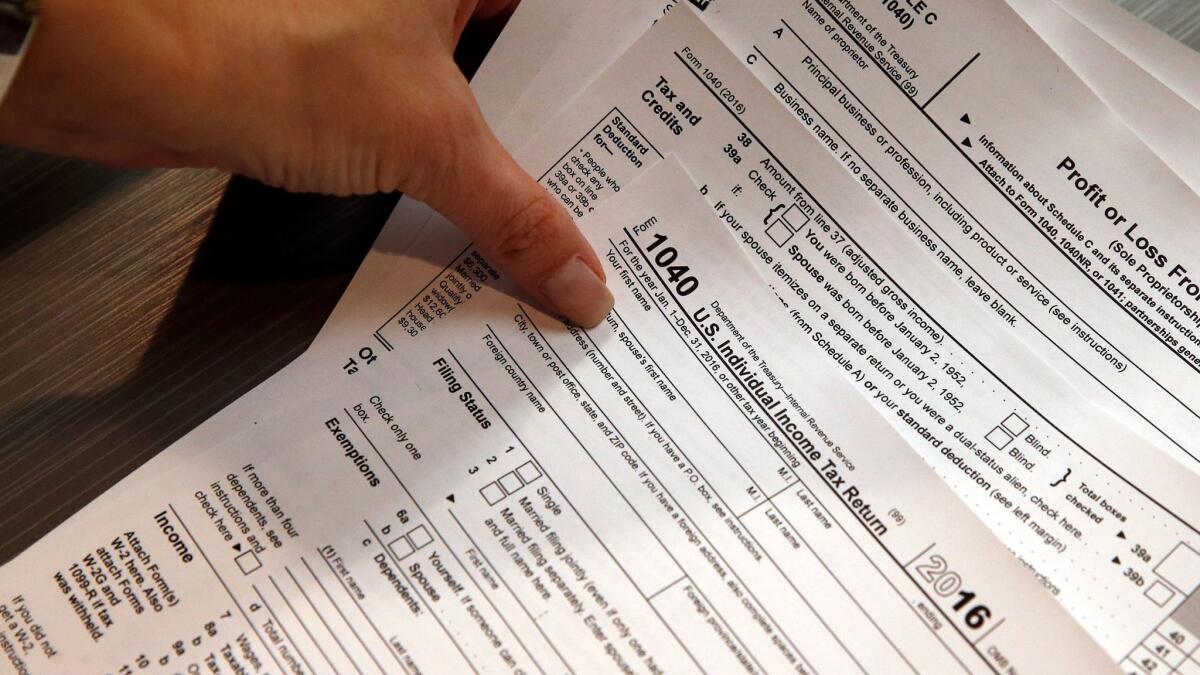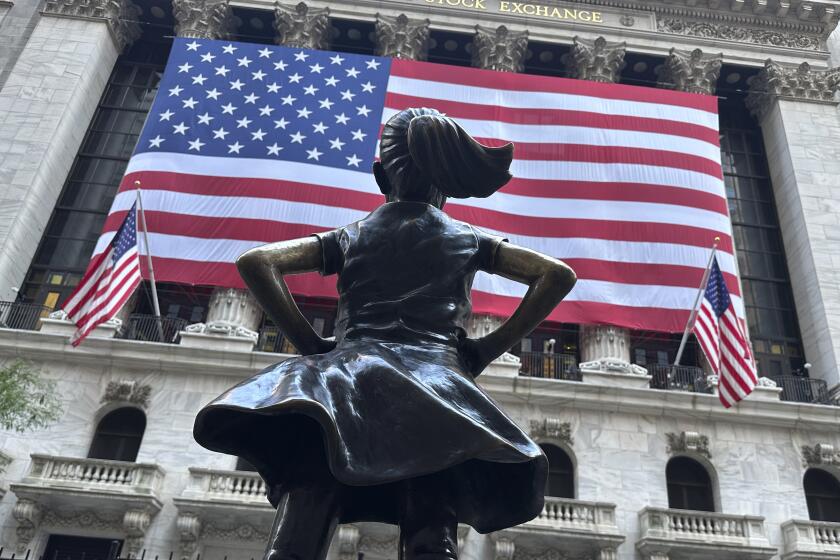Column: The IRS hired bill collectors to collect back taxes — and got ripped off

For all its faults, the Internal Revenue Service at least is expected to know the value of a dollar. But its math skills — and management savvy — have been called into question by a recent internal report finding that in setting up a program allowing private bill collectors to dun taxpayers for back taxes, it spent $20 million in 2016 and 2017 to collect only $6.7 million.
The report came from Nina E. Olson, head of the agency’s Taxpayer Advocacy Service. Olson found not only that the IRS was paying the private bill collectors commissions they didn’t earn, but that it also allowed them to go after money that’s exempt from collection under the law.
What may be worst about the program is that it was focused on low-income taxpayers and resulted in some repayment agreements that left the taxpayers without enough money to live on.
Maybe this program eventually will pay for itself. But...the evidence suggests it’s a much better deal for the debt collectors than for the rest of us.
— Howard Gleckman, Tax Policy Center
Blame for the fiasco belongs to Congress, which has systematically demolished the ability of the IRS to collect unpaid taxes from wealthy taxpayers while demanding that the agency step up its pursuit of working-class Americans. No one can say that Congress didn’t know better: As Howard Gleckman of the Tax Policy Center observes, this was the third time that Congress sponsored a private bill-collection program — and the last two attempts failed, too. Indeed, Olson herself stated in 2016 that they were “dismal failures just from a business case.” By then, the die had been cast, as Congress had slipped the bill-collection provision into a highway bill in 2015.
Almost immediately, Olson warned that the program was being implemented illegally and was targeting taxpayers “facing financial hardship.” Her latest report found that the IRS paid out $1 million in commissions to the bill collectors and spent an additional $19 million setting up the program. For every year it continues, she noted, the IRS expects to spend $16.5 million in recurring costs. That suggests the program will continue to lose money on every dollar it brings in, on a scale that can’t be made up in volume.
“Maybe this program eventually will pay for itself,” Gleckman writes. “But, so far, the evidence suggests it’s a much better deal for the debt collectors than for the rest of us.”
Olson listed the bill-collection program first among the 21 “most serious problems” with the IRS she found in 2017. (By law, the Taxpayer Advocate is required to list at least 20 such problems each year.) Here are the issues she pinpointed in the latest bill-collection effort:
— The IRS paid commissions to bill collectors for tax payments that the IRS itself collected. About one-fifth of the back taxes the IRS received — $1.2 million of the total $6.7 million collected — actually came in within 10 days of the agency sending the taxpayers letters informing them their debt was about to be turned over to bill collectors, but before the private collectors took action.
Those accounts were supposed to be withdrawn from the bill collectors portfolios, but weren’t. As a result, the IRS paid the collectors more than $1 million in commissions for doing nothing.
— The bill collection program targeted low-income taxpayers. Among the 4,141 taxpayers whose accounts were checked by the Taxpayer Advocate, the median income was $40,955, or about 30% below the national median of about $59,000. About 28% had annual income less than $20,000, and 1 in 5 had incomes below the federal poverty level, with median income of $6,386. Five percent were receiving Social Security retirement or disability benefits; the median income for that group was $14,365.
According to IRS regulations, Social Security and Supplemental Security Income benefits are exempt from IRS attachment. The IRS told Olson that it couldn’t be sure if the bill collectors honored the exemptions because the records it used to deliver accounts to the bill collectors didn’t distinguish among sources of income.
— The bill collectors placed some taxpayers into repayment plans they couldn’t afford. The IRS typically judges whether paying off a tax debt will leave a taxpayer without enough money to cover basic living expenses. If repayment will leave the taxpayer with less than this so-called allowable expense standard, it designates the bill as “not collectible-hardship” and ceases collection efforts.
Olson found that installment payment deals made by the private bill collectors violated that standard “with unacceptable frequency.” Among the 1,676 taxpayers who entered those agreements, nearly half were left with income less than the allowable standard.
None of this should have come as a surprise. Previous programs outsourcing tax collection to private bill collectors were similarly underwhelming. The Taxpayer Advocate Service determined that under the last such program, private bill collectors performed fairly well during the first six months of the two-year study period, but fell sharply behind the IRS after that. The reason, the advocate conjectured, was that the private collectors disposed of “easy” cases first — chiefly those involving taxpayers who responded promptly to their first phone calls.
After that, the private collectors stopped pushing. The IRS, however, kept up its own collection efforts over subsequent months. The agency also was able to collect back taxes by offsetting them from refunds due the same taxpayers. As a result, the IRS did much better over time even though it had inherited the tough cases at which the private collectors failed.
The fundamental issue with these programs is why collecting taxes should be outsourced at all. Not only has it been proved time and again to fail, it’s a basic government function.
The IRS needs to remain involved in collections, Olson told a taxpayer advocacy forum in 2016, in part so it can figure out the reason for shortfalls and educate taxpayers about what they owe and why. “The private debt collectors aren’t interested in any of that,” Olson said. “There is just pressure to get as much money upfront from the taxpayer.”
Turning this function over to bill collectors is especially perilous, she added, because “private debt collectors have the highest number of complaints to the Federal Trade Commission [of any] industry whatsoever.” That’s important because “we want people to comply with the law voluntarily,” and bill collectors’ strong-arm tactics don’t meet that standard.
You want decisions about how firmly to go after delinquent taxpayers to be made by an agency that has the legal authority to make decisions that aren’t based on the profit motive, tax law expert Adam Chodorow of Arizona State University wrote last year.
He didn’t say so, but the best historical lesson of the downside of farming out tax collection to private entities comes to us from 18th century France, when Louis XVI turned the task over to an entity known as “money farms.” Their behavior infuriated peasants, and the king ended up losing his head. How many lessons does Congress need before it gets the message?
Keep up to date with Michael Hiltzik. Follow @hiltzikm on Twitter, see his Facebook page, or email michael.hiltzik@latimes.com.
Return to Michael Hiltzik’s blog.







